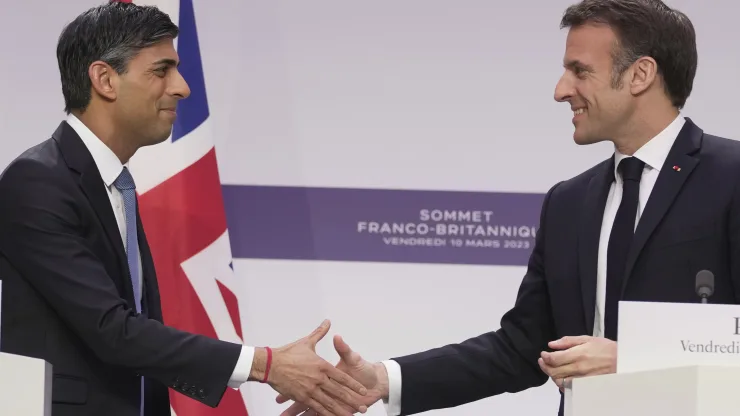France and Britain are battling it out for Europe’s A.I. crown

The capital of artificial intelligence in Europe is being contested by two countries.
As each tries to stake out a stake in the highly hyped market for artificial intelligence, British Prime Minister Rishi Sunak and French President Emmanuel Macron have made bold statements about AI.
Viva Tech, France’s annual tech conference, on June 18, saw Macron tell CNBC’s Karen Tso that Europe is number one in artificial intelligence, while Sunak promoted the U.K. at London Tech Week as a “geographic home of global AI safety regulation.”
Around the world, governments see AI as a revolutionary technology and therefore as a strategic asset.
There has been a lot of hype around the technology thanks to Microsoft’s support of OpenAI’s ChatGPT, which has gone viral. Using the most crucial technologies has also been a source of tech tension between the U.S. and China.
Which company is leading the race for Europe’s AI crown?
Money matters
In Paris, Macron announced 500 million euros ($562 million) of new funding for AI “champions” as part of VivaTech. The government has already committed to investing 1.5 billion euros in artificial intelligence before 2022, in an effort to catch up with the U.S. and Chinese markets.
“We will invest like crazy in training and research,” Macron told CNBC, adding that France is well-positioned in AI because of its access to talent and startups.
Earlier this year, the British pledged $1 billion ($1.3 billion) to supercomputing and AI research as it seeks to become a “science and technology superpower.”
Among the strategy’s goals is to build an “exascale” computer capable of building its own “BritGPT” to compete with OpenAI’s generative AI chatbot.
Some officials have criticized the funding pledge as insufficient to help the UK keep up with the U.S. and Chinese titans.
In a fireside discussion at London Tech Week, Sajid Javid stated, “It sounds great, but we’re nowhere near there.”
Policing A.I. abuses
It is notable that the U.K. has a different approach to laws than France. One of the major differences between the U.K. artificial intelligence laws and the existing laws in France is how they are regulated.
Introducing the first comprehensive set of laws relating to artificial intelligence in the West, the European Union has its AI Act. In June, European Parliament lawmakers approved the legislation.
Different applications of AI are rated according to their risk level – for example, real-time biometric identification and social scoring systems are considered “unacceptable risks,” and are therefore prohibited.
CNIL or a new AI-specific regulator will be directly regulated by the AI Act in France, so Minesh Tanna, global AI lead at international law firm Simmons & Simmons, says it would not surprise him if the relevant French regulator took an “aggressive approach” to enforcing the law.
The U.K. government issued a white paper instead of passing AI-specific laws, advising various industry regulators on how to enforce existing laws. An approach to regulating AI based on principles is presented in the white paper.
Tanna described the framework as more “pro-innovation” than the French approach. “The UK’s approach is driven by a desire to encourage AI investment in a post-Brexit world,” he said, giving the UK “more freedom and flexibility to pitch regulation at an appropriate level to encourage investment.”.
As a result of its burdensome regulatory regime for AI, the EU’s AI Act may make France “less attractive” for investments in artificial intelligence.
Who will win?
In an email to CNBC, Anton Dahbura, co-director of the Johns Hopkins Institute for Assured Autonomy, said France has a strong chance of leading Europe.
According to Alexandre Lebrun, CEO of Nabla, an AI “copilot” for doctors, the U.K. is “probably on par” with France as a place to start an AI business.
“There is a good talent pool, strongholds like Google and Facebook AI research centers, and a reasonable local market,” he told CNBC, but the EU AI Act will make it “impossible” for startups to build AI there.
If the United Kingdom changes its laws, it will definitely win against the EU and France,” Lebrun said.
In the meantime, London has faced much criticism from some corners of the tech industry for being unattractive to entrepreneurs.
A series of political crises in the country has dented investor sentiment on tech generally, according to Labour Party leader Keir Starmer. “Many investors are not investing in the UK right now because we do not have the political certainty we need to invest,” Starmer said.
YesWeHack’s CFO Claire Trachet said the United Kingdom is capable of challenging U.S. giants in artificial intelligence, but collaborating across Europe is as important as competing.
“Europe’s tech superpowers would need to work together in concert,” she said. Investing in nurturing a robust ecosystem will allow them to truly make a meaningful impact.”
Combined strengths, especially with Germany’s involvement, could allow them to disrupt the AI landscape within 10-15 years, but this would require a highly strategic vision and collaborative approach,” Trachet said.
